|
May 26, 2020 - No. 36
All Out to Uphold the Rights of
Temporary Foreign Workers
and Asylum Seekers!
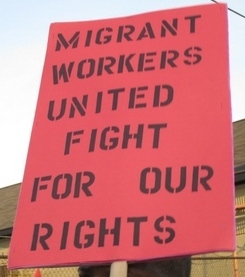 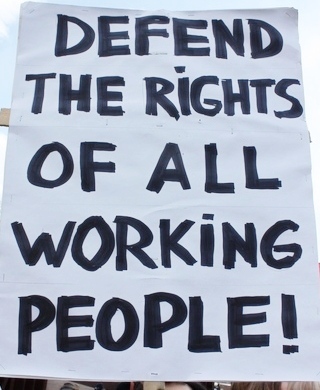 
• Oppose
Unconscionable
Government Attempts to Criminalize Asylum
Seekers and Justify Immoral Crimes Against
Them - Diane Johnston
• Quebec
Government Quashes Motion Recognizing
Invaluable Contribution of Asylum Seekers and
Calling on Canadian Government to Regularize
Their Status • Call
to Regularize Status of Essential Workers
- Guillaume Cliche-Rivard, President, Quebec
Immigration Lawyers Association
• Ontario
Migrant Farm Workers Hit by COVID-19 - Steve
Rutchinski
• Nova
Scotia Federation of Labour Demands Health
Care Coverage Be Extended to Uninsured
Residents
The Need to
Make Transit Workers Safe
• Workers Call for
Mandatory Face Masks on Public Transit
United
States
• Sanitation Workers in
New Orleans on Strike to Demand Better
Conditions
and Pay
All Out to Uphold the Rights of
Temporary Foreign Workers and Asylum Seekers!
- Diane Johnston -
 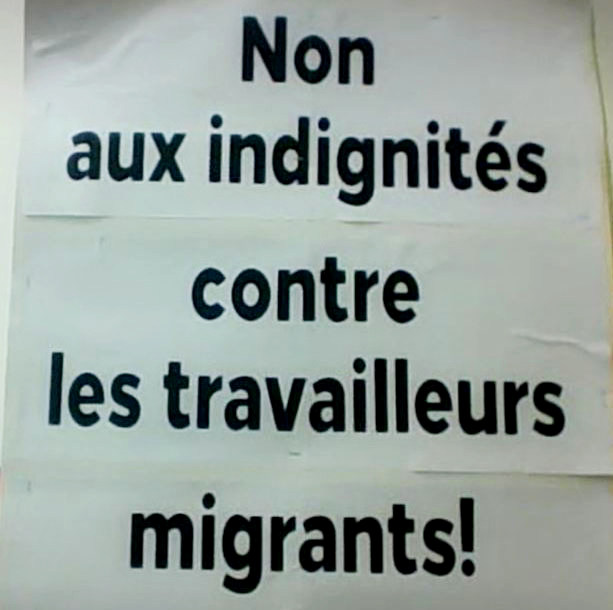
Many organizations in Quebec and across Canada
are working together to uphold the rights of
asylum seekers and temporary foreign workers who
are on the front line of fighting COVID-19.
Besides rescuing them from the abhorrent
situations in which unjust government treatment
has placed them, these organizations are
upholding the just demand that the Quebec and
federal governments need to create a special
program that would regularize the status of
these workers in this country.
On March 18, when asked by a journalist about
asylum seekers entering irregularly into Canada,
Quebec Premier François Legault responded, "It's
unacceptable. We cannot permit people to enter
illegally without at least placing them in
quarantine. I have therefore already discussed
this issue on a number of occasions with the
federal government." The very next day, Prime
Minister Trudeau, as part of his decision to
close the Canada-U.S. border, announced that his
government would no longer allow asylum seekers
to enter Canada irregularly through such
crossings as Roxham Road, in Quebec's Eastern
Townships.
People seeking safety in Canada cross the
border irregularly in order to avoid being sent
back to the U.S. under the Safe Third Country
Agreement, which closes Canada's door to most
refugee claimants at the official points of
entry. In closing such crossings, it is Canada
which is acting "irregularly" in violation of
the very essence of conventions which establish
how and why countries are duty-bound to welcome
refugees and the standard of treatment they must
receive.
 The utter lack of
humanity shown asylum seekers by the likes of
the federal government, the Quebec government
and the Conservative Party reveals not only
their contempt for asylum seekers but also for
the rule of law. Their contemptible treatment of
asylum seekers is carried out in the name of the
rule of law. In fact, they rule in our name and
they do these things in our name. It must not
pass! The utter lack of
humanity shown asylum seekers by the likes of
the federal government, the Quebec government
and the Conservative Party reveals not only
their contempt for asylum seekers but also for
the rule of law. Their contemptible treatment of
asylum seekers is carried out in the name of the
rule of law. In fact, they rule in our name and
they do these things in our name. It must not
pass!
For Premier Legault and others to declare that
asylum seekers enter Canada illegally is
unfounded. It promotes the same notion of
criminality that the Trudeau Liberal government
attempted to introduce in July 2018 when the
Prime Minister appointed former Toronto police
chief Bill Blair to the newly created position,
Minister of Border Security and Organized Crime
Reduction. Through sleight of hand, the Liberal
government found a way to link vulnerable
migrants with border security and organized
crime. By making the irregular crossing of
asylum seekers through Roxham Road and elsewhere
in Canada an issue of law and order, asylum
seekers have been turned into a criminal
category, all in the name of upholding fair
treatment and the rule of law. This is
unconscionable. It shows they are not fit to
govern and that Canadians must uphold the basic
principle that might does not make right.
More recently, on May 8, during the federal
ministers' and health officials' update on
COVID-19, a Quebec journalist commented that
although many Haitian asylum seekers who entered
Canada in 2017 are working in Montreal
residential and long-term care centres and
seniors' residences at the risk of their lives,
their refugee claims have been refused.
"Regarding the issue of asylum seekers, as you
know very well, Canada has a system, a just
system, a very well-regulated system, to
determine who has the right to asylum in
Canada," responded Deputy Prime Minister
Chrystia Freeland with all the
self-righteousness and arrogance she could
muster. "And it's important that as a country
where there is rule of law, that we continue
[...] to be that," she said.
This typical neo-liberal evasive bluster shows
the utter contempt of the Liberals and their
government for rule of law. Canada's system is
not just nor does it uphold the principles of
international refugee law and it is inhumane.
The Liberals are past masters at doublespeak
which ensures the essence of every matter is
left in the shade or discarded altogether. Their
responses to valid questions of concern to the
polity and the people is unconscionable. It
shows that it is up to Canadians to stand up for
asylum seekers, refugees, migrant workers,
temporary foreign workers and all others who are
particularly vulnerable to neo-liberal
governments who treat them as "easy prey." All
power to the organizations across the country
who spare no efforts to uphold the rights of the
most vulnerable people in our society.
Condemn the arrogance of those rulers who
commit crimes against human persons in the name
of rights, justice and law.
Our Security Lies in the Fight
for the Rights of All!

On May 13, during a sitting of the Quebec
National Assembly, where the invaluable
contribution of health care workers on the front
line of fighting the pandemic was being
discussed and highlighted, Catherine Fournier,
Independent Member for the riding of
Marie-Victorin, in agreement with Monique Sauvé,
Liberal Party Member (Fabre); Sol Zanetti,
Québéc Solidaire Member (Jean-Lesage); and
Guy Ouellette, Independent Member (Chomedey),
rose to present the following motion without
notice:
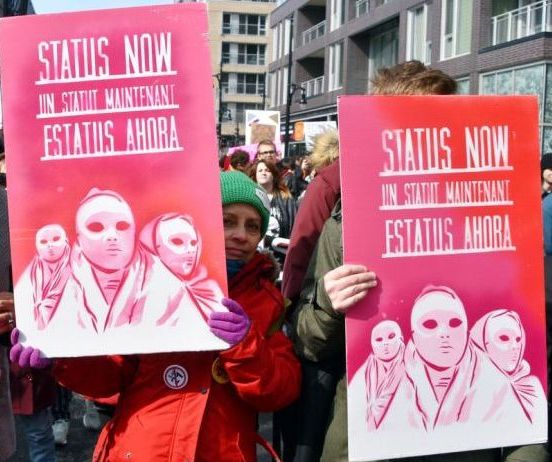 "That the
National Assembly recognize the contribution of
hundreds of asylum seekers, mainly of Haitian
origin, presently working as patient attendants
in Quebec's CHSLDs [Residential and Long Term
Care Centres]; "That the
National Assembly recognize the contribution of
hundreds of asylum seekers, mainly of Haitian
origin, presently working as patient attendants
in Quebec's CHSLDs [Residential and Long Term
Care Centres];
"That it request that the Canadian government
quickly regularize their immigration status,
while recognizing the work they have done during
the present health emergency."
To debate the motion in the National Assembly
required the unanimous consent of all the
parties. When asked by the Leader of the
National Assembly if there was
consent, Coalition Avenir Québec (CAQ)
Deputy House Leader Éric Caire responded that
there was no consent, thereby quashing any
debate on the motion.
Two days later during Premier Legault's daily
press update on COVID-19, a journalist from In Texto, a
newspaper addressing itself to Montreal's
Haitian community, asked the Premier if what had
transpired in the National Assembly was also his
position.
"Let's begin by speaking in general terms about
asylum seekers," Legault answered. "We've spoken
about this at length over the last year, about
all those who enter through Roxham Road. Within
the framework of the pandemic, even Mr. Trudeau
does not want us to be receiving asylum seekers
that enter through Roxham Road. We've locked the
borders and [...] we discussed with Mr. Trudeau
yesterday evening about extending that closure
by a month. That's one thing. This does not mean
that with regard to asylum seekers, including
members of the Haitian community, that there are
not good people there who have come to work in
our CHSLDs. These are two separate files. [...]
[W]e have two members of the Haitian community
in our Cabinet and I am aware of the problem of
the Haitian community in certain Montreal
neighourhoods. And by the way, that's why,
amongst other reasons, we're giving a million
masks to [Montreal Mayor] Valérie Plante, so
that she can distribute them freely in
neighbourhoods where it's more difficult.
"So I think that the two files have to be
separated. Asylum seekers are one thing,"
Legault continued, "So let's not mix up the
refugee file -- people going through Roxham
Road, with the file on the Haitian community."
The journalist responded, "No, it's because
they are here, Mr. Legault, because they
are here. But that does not answer my
question, Mr. Legault. Do you back that
position?"
Legault replied, "Well listen, what I
understand from your question, what was being
asked was to support the arrival of asylum
seekers." He then said, "Within the framework of
the pandemic, neither the Quebec government nor
the Canadian government supports that at
present. I am therefore also not a proponent."
The journalist then interjected to clarify that
his question did not relate to the matter
Legault gave his opinion about, saying, "No,
it's not about them coming ...." at which
point he was cut off as someone asked for the
next question.

- Guillaume Cliche-Rivard,
President,
Quebec Immigration Lawyers Association -
On the front lines with our seniors in CHSLDs
[residential and long-term care centres] or
behind the scenes in our grocery stores and food
processing plants, these essential workers have
played, are playing and will continue to play a
crucial role in the proper functioning of our
lives in society. We believe that it is time for
their contribution to be recognized and call
upon the federal government to quickly
regularize their immigration status.
Indeed, at a time when the risks have increased
and when it has never been so dangerous to get
to work, they have not given up and are
demonstrating each and every day their loyalty,
courage and unwavering love for their land of
refuge. They actually watch over us at all hours
of the day and night and are fighting with us to
defeat this adversary that recognizes no
borders.
Far removed from the limelight, they represent
a key component in the often already precarious
equilibrium of our institutions, notably in the
area of health care, and take on an often
unenviable job, without knowing for how long
their own security and that of their family can
be ensured.
It is actually without any guarantee of their
future in Canada that day in, day out, they
prove their essential role in our society.
These workers risk their lives for us without
knowing whether they'll be able to remain in the
country with their children fully integrated in
our schools, developing and forming a Canadian
identity for themselves with their friends and
teachers. Every day they end their shifts not
knowing if they will be forced to abandon their
family and friends, with whom they have
developed strong ties in Canada, often under
very difficult conditions.
They contribute, day after day, to the
betterment of our society without knowing
whether or not the lives they have built here
will go up in smoke. Without knowing whether
they themselves will remain safe for long in
Canada, they go off to work to save lives, our
lives.
This hell of uncertainty may last for years,
during which the risk of being deported becomes
more and more difficult to bear and dignity
slowly evaporates as a result of feeling
invisible and nonexistent. Every day that
weight on their shoulders becomes heavier,
until their psychological distress is palpable.
Is it not high time that we show them our
gratitude, by regularizing their status and
formally recognizing their contribution to our
society? Is it not time that we extricate our
guardian angels from the hell caused by the
uncertainty of their future and that of their
children?
It is now our turn to ensure that they are
protected.

- Steve Rutchinski -
Migrant farmers at Greenhill Produce in Kent
Bridge, in southwestern Ontario, were reportedly
the first to have experienced an outbreak of
COVID-19 on an Ontario farm. Greenhill Produce
is a hydroponic operation specialized in growing
a variety of bell peppers. The outbreak there
was first reported on April 28 with the number
of confirmed cases rising steadily, reaching 100
on May 21.
 The Chatham-Kent
Public Health Unit reported 14 new cases on May
15, bringing the total at Greenhill to 81
confirmed cases -- 78 of them migrant workers
living in bunkhouse conditions and the other
three Chatham-Kent residents. That amounted to
two-thirds of Chatham-Kent's 121 total confirmed
COVID-19 cases at the time. The 100 confirmed
cases reported on May 21 include 13 "contract
workers" brought in daily from Leamington where
they are housed in hotels and motels and are
currently self-isolating. Their cases are not
included in the numbers reported by the
Chatham-Kent Health Unit, but by the
neighbouring Windsor-Essex Public Health Unit. The Chatham-Kent
Public Health Unit reported 14 new cases on May
15, bringing the total at Greenhill to 81
confirmed cases -- 78 of them migrant workers
living in bunkhouse conditions and the other
three Chatham-Kent residents. That amounted to
two-thirds of Chatham-Kent's 121 total confirmed
COVID-19 cases at the time. The 100 confirmed
cases reported on May 21 include 13 "contract
workers" brought in daily from Leamington where
they are housed in hotels and motels and are
currently self-isolating. Their cases are not
included in the numbers reported by the
Chatham-Kent Health Unit, but by the
neighbouring Windsor-Essex Public Health Unit.
Meanwhile at a greenhouse in Leamington,
another 14 migrant contract workers, also
included in the numbers reported by the
Windsor-Essex Public Health Unit, were reported
as testing positive. On May 25, the
Windsor-Essex Medical Officer of Health
announced in his daily update that 33 of the 36
new confirmed cases were farm workers linked to
"many" of the 170 agri-food facilities in the
area. He said those affected were both migrant
workers living in residences attached to farms
and local workers living in the community.
Elsewhere, the Haldimand-Norfolk Public Heath
Unit has reported eight temporary farm workers
have tested positive for COVID-19 and has
expressed concerns about the viability of the
region's medical facilities given the large
number of migrant farm workers employed in that
region.
In discussing the Greenhill Produce outbreak,
Chris Ramsaroop, speaking on behalf of Justice
for Migrant Workers which advocates for foreign
contract workers, said, "This is something that
was preventable." He said "For the past couple
of weeks, we've been trying to sound the alarm
about the spread of the pandemic on farms."
Ramsaroop is calling for increased inspections
and the regulation of bunkhouse-type housing and
greater access to personal protective equipment
for farm workers to help prevent the spread of
COVID-19.
Migrant farm workers, on arrival in Canada, are
put into quarantine for 14 days. That means
those who have become infected, contracted the
disease here. Bunkhouse living conditions are a
significant contributing factor. While
governments at the federal and provincial levels
say they have taken appropriate measures and
provided financial assistance to farmers to
improve living conditions to minimize the spread
of COVID-19 infection amongst these workers,
Justice for Migrant Workers posted a video
recently, available
here, which shows these workers are still
being warehoused in large, contained
spaces.
 It is reported
that Ontario farms rely on some 20,000 migrant
workers each year. Canada contracts about 60,000
migrant farm workers per year in total. They
come from the Caribbean, Mexico and
elsewhere. They prepare vineyards, orchards and
fields. They plant and harvest. They also work
in more industrial settings, such as
greenhouses, hydroponic farms, and mushroom
factories. It is reported
that Ontario farms rely on some 20,000 migrant
workers each year. Canada contracts about 60,000
migrant farm workers per year in total. They
come from the Caribbean, Mexico and
elsewhere. They prepare vineyards, orchards and
fields. They plant and harvest. They also work
in more industrial settings, such as
greenhouses, hydroponic farms, and mushroom
factories.
These migrant workers are highly skilled, very
productive and dedicated workers. Canadian
agriculture depends on them. The first thing
that is needed to protect these workers is to
recognize that they are vital to the Canadian
economy, an important part of the Canadian
working class, and to provide these workers with
permanent resident and citizenship status.

On May 11, the Nova Scotia Federation of
Labour sent a letter to the provincial
government urging that during the COVID-19
pandemic they extend health care coverage to
those Nova Scotia residents who are currently
uninsured and do not meet the eligibility
criteria for provincial health care coverage.
The letter, signed by the Federation's
President Danny Cavanagh, states in part:
"We know that migrant workers, international
students, and undocumented migrant workers
cannot travel home and/or some will be coming
into the province to work. We need to ensure
they have medical coverage as the COVID-19
health crisis continues.
"We know that the health of our province
depends on the health of all Nova Scotians. When
the most vulnerable people are denied health
care and believe they are unable to access free
testing and treatment for COVID-19, it puts our
entire community at risk of a more rapid and
greater spread of the virus. Migrant workers,
international students, and undocumented
migrants who have lost their status are all at
risk of contracting the virus and spreading it
without access to easily acceptable public
healthcare."
The letter then highlights that some of these
workers and international students have private
emergency service insurance, but it may not
cover COVID-19 assessments, testing or
treatment. Others will face the impossible
barrier of paying upfront for services and
waiting for insurance companies to reimburse
them in those cases where the insurance covers
COVID-19 situations. And still others have no
health insurance at all.
This means, states the letter, that, along with
the fear of possible detention or deportation
that hangs over their head, this is another
pressure to keep these members of the community
from seeking health care services, which
increases the risk of the spread of the virus in
the community.
Free and easily accessible health care coverage
for the most vulnerable people is therefore a
need to protect their health, help flatten the
curve of COVID-19 and protect the health and
safety of all, the letter concludes.

The Need to Make Transit Workers
Safe
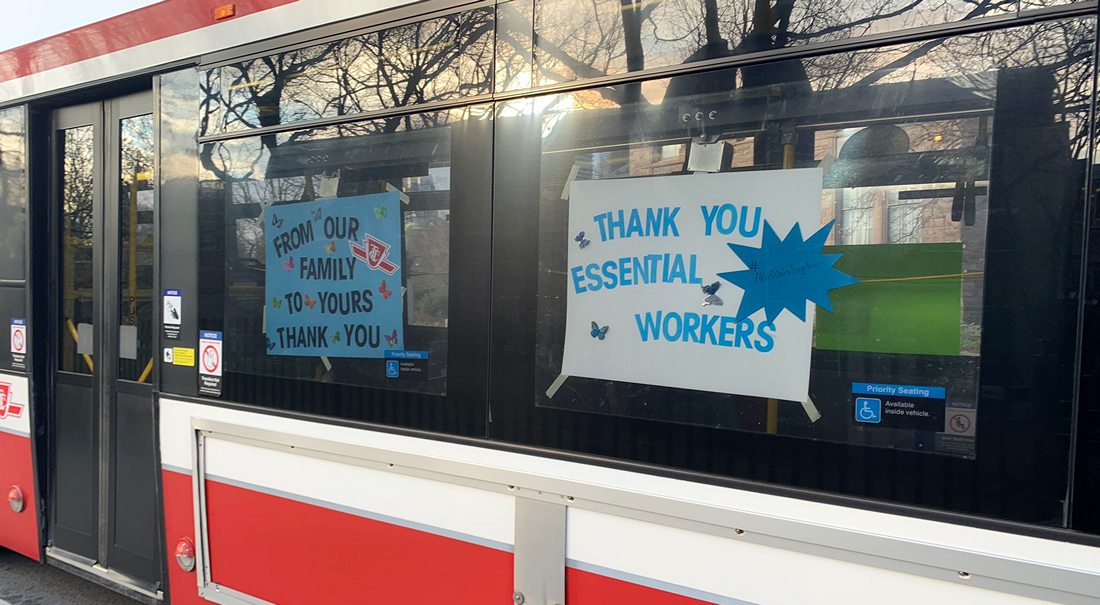
On May 8 the Amalgamated Transit Union (ATU)
Local 113, representing the men and women who
operate and maintain North America's third
largest public transit system, as well as the
transit operators of Transdev Canada in the York
Region just north of the City of Toronto, issued
a call for mandatory use of face masks on public
transit to protect against the transmission of
COVID 19. The statement reads:
"The union representing 12,000 Toronto Transit
Commission (TTC) workers today is calling on the
City of Toronto to make it mandatory for TTC
riders to wear face masks or face coverings on
local public transit.
"On the eve of the TTC's 15 per cent cut in
transit service, which takes effect on Sunday,
May 10, Amalgamated Transit Union Local 113 is
concerned the service cuts will lead to crowding
on several TTC routes, increasing the risk of
spreading the coronavirus on the TTC.
"'The math is straightforward -- as more
businesses re-open, more people will be taking
public transit with less TTC vehicles on the
road,' said Carlos Santos, ATU Local 113
President. 'The City of Toronto must protect
workers and the public by making face coverings
mandatory on the TTC.'
"Several North American municipalities,
including New York City and Montreal, have or
are considering making face masks mandatory on
public transit.
"ATU Local 113's call for mandatory face
coverings on local public transit comes at a
time when the Ontario government and City of
Toronto are moving towards re-opening the
economy, which will increase TTC ridership.
"'As Ontario starts to re-open the economy,
there is no time to waver in protecting the
public and workers,' said Carlos Santos. 'We
must be ready for the increase in ridership as
more people will depend on the TTC to get to
work safe.'
"Despite calls from numerous organizations,
including ATU Local 113, the federal and
provincial governments have yet to provide
emergency financial support for the TTC and
other public transit services. Without urgent
action from senior levels of government, the TTC
is set to lay off 1,200 workers and cut transit
service by 15 per cent. These service cuts will
have a significant impact on many low-income
essential workers who depend on the TTC to get
to hospitals, long-term care homes, grocery
stores, pharmacies and other critical services
during the COVID-19 pandemic.
"'Public transit workers have been on the
frontlines of the coronavirus pandemic since the
very beginning,' said Carlos Santos. 'Instead of
supporting TTC workers who have put themselves
and their loved ones at risk, government
inaction will lead to pink slips for many public
transit workers and hurt some of our city's most
vulnerable people who depend on the TTC. How is
this fair?'"

United States
- Peoples Dispatch -
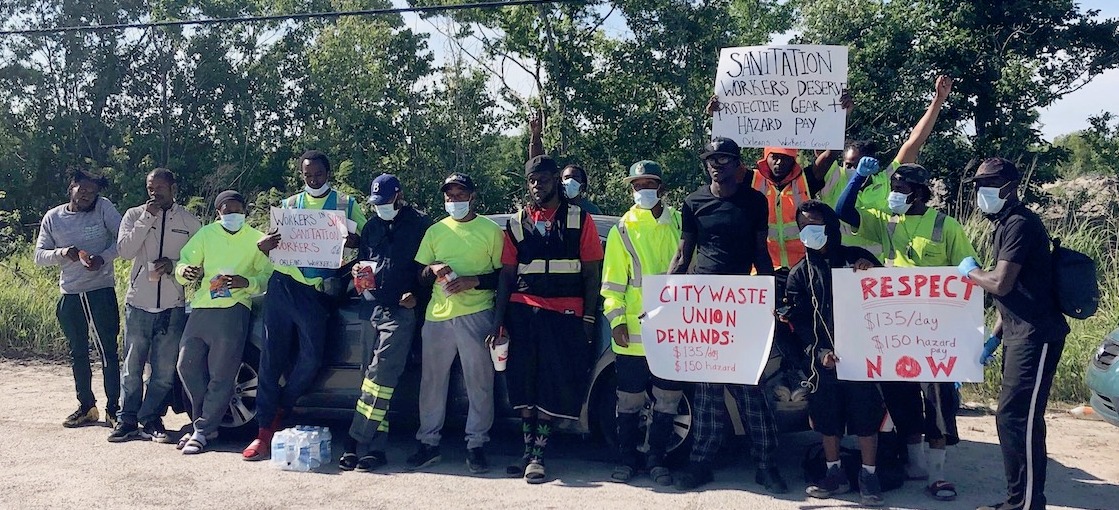
In the wake of the coronavirus pandemic, across
the world workers on the frontlines of the
battle against the spread of the disease have
been organizing to demand that governments and
employers provide them greater protection. In
New Orleans, a group of sub-contracted
sanitation workers who work as "hoppers" on
garbage trucks have been on strike since
Tuesday, May 5, to demand hazard pay and
personal protective equipment (PPE).
The workers in New Orleans said they are not
being provided PPE by their employers and are
being exposed to coronavirus and other health
hazards on the job. Due to these risks, they are
demanding $135 standard day rate plus $150
hazard pay per day until the end of the
pandemic. They also demand the provision of
adequate protective equipment every day and the
seven paid sick days hoppers are entitled to
under the city's Living Wage Ordinance
The workers are not directly employed by the
city, and their conditions are related to their
precarious position as sub-contractors. The city
of New Orleans has a $10 million contract with
Metro Services Group, a private corporation, to
garbage and recycling collection services for
the city. The group of sanitation workers on
strike are not even hired directly by the Metro
Services Group but through People Ready, an
app-based temporary hiring agency.
The response of New Orleans Mayor LaToya
Cantrell to the sanitation workers' strike was
essentially to deflect the responsibility
towards the workers' safety onto Metro Services
Group. She released a statement saying that
"Metro is responsible for providing workers with
the necessary items for their safety. This would
include masks, gloves, etc."
Sanitation worker Greg Woods spoke to New
Orleans local news and explained that many of
the issues they are raising "have been going on
before the coronavirus even came. We get paid
late, everything is bad." He also pointed to the
fact that they work grueling hours from 4:20 am
until 4:00 pm and their pay for this labour is
insufficient.
In 2015, the city of New Orleans passed a
resolution to guarantee that city-contracted
workers receive a living wage. According to a
2017 study by Louisiana Association of United
Ways in the Orleans Parish which encompasses the
New Orleans metro area, a living wage to support
a family of four is $26 per hour, much less than
what the hoppers are paid who do work for the
city.
The workers are also fighting for the right to
form a labour union -- the City Waste Union --
in order to advocate for better working
conditions. They drafted a petition to raise
their demands with mayor Cantrell and to call on
her to intervene on their behalf with Metro
Services Group. The petition states, "Some of
our most essential workers are not being treated
with the dignity and respect they deserve.
During the COVID-19 crisis, New Orleans garbage
hoppers are working long, grueling shifts in bad
conditions, without adequate proper protective
equipment (PPE), for low pay. Our sanitation
workers put their lives on the line every day to
keep this city safe and clean, and now we must
support them as they organize for their rights."
New Orleans and the state of Louisiana were
hotspots early on in the outbreak of the
COVID-19 pandemic in the United States. The
State of Louisiana has recorded 30,652 confirmed
cases and 2,135 deaths, and 1,432 people have
been hospitalized.

(To access articles
individually click on the black headline.)
PDF
PREVIOUS ISSUES
| HOME
Website: www.cpcml.ca
Email: office@cpcml.ca
|

